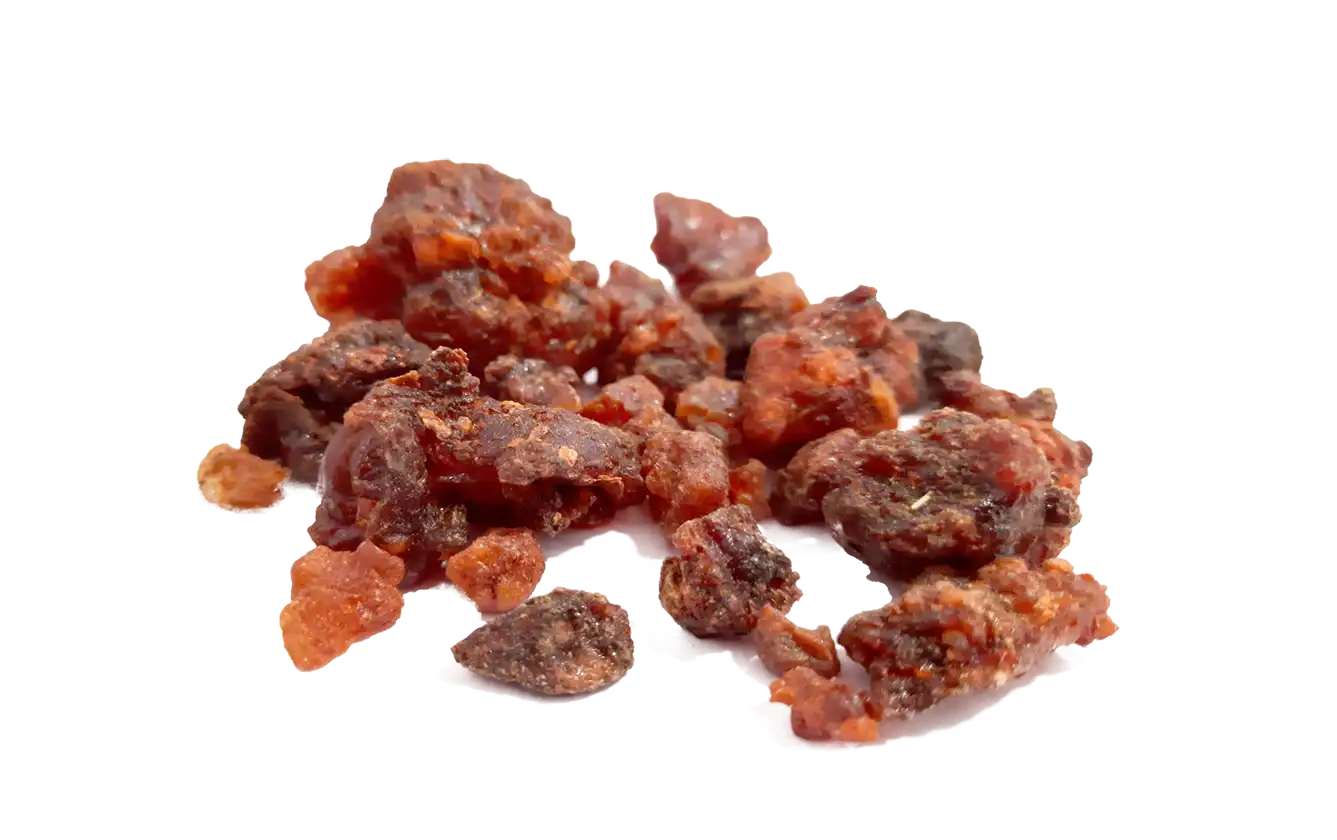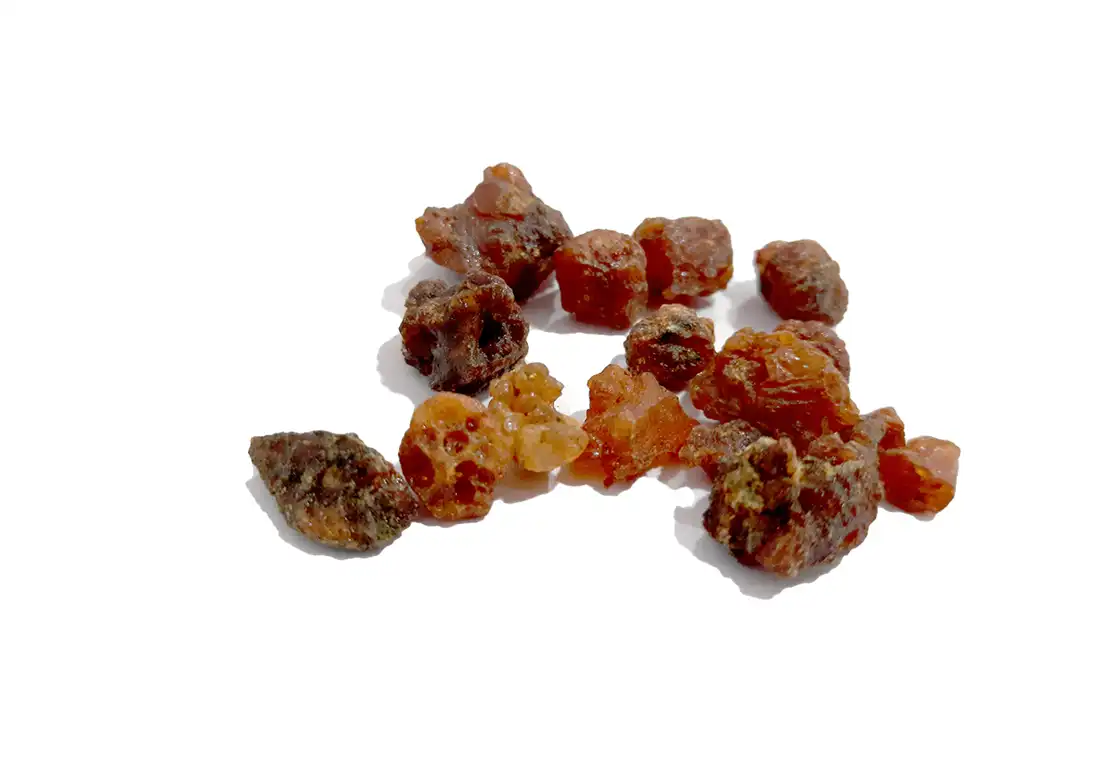Myrrh essential oil
Commiphora myrrha
Myrrh essential oil, extracted from the resin of the Commiphora myrrha tree, has been cherished for thousands of years for its medicinal, spiritual, and aromatic properties. With a rich, earthy aroma and a warm, slightly balsamic scent, myrrh essential oil has played a significant role in ancient rituals, traditional medicine, and even culinary practices. Its versatility and therapeutic potency make it one of the most revered essential oils in the world.
Historical Significance of Myrrh
Myrrh’s history stretches back to ancient times, particularly in the regions of the Middle East and North Africa, where the Commiphora tree thrives. The word “myrrh” is derived from the Arabic word murr, meaning bitter. Ancient Egyptians used myrrh resin in embalming and religious ceremonies, believing it had purifying and preserving qualities. In the Bible, myrrh is frequently mentioned as a valuable commodity. It was one of the gifts brought by the Magi to the infant Jesus, symbolizing its great worth and significance. The Greeks and Romans used myrrh for its antiseptic and healing properties, while traditional Chinese medicine incorporated it into treatments for wounds, infections, and inflammatory conditions.
Production of Myrrh Essential Oil
The process of producing myrrh essential oil involves harvesting the resin from the bark of the Commiphora myrrha tree. Once the resin hardens, it is collected and subjected to steam distillation to extract the essential oil. The resulting oil is thick, amber-colored, and highly aromatic. Because of its labor-intensive harvesting and low yield, myrrh essential oil is considered precious and relatively expensive.

Scent description
Warm, smokey, woody, dry
Usage
Inhaled | topically | internally
Effects, use cases
Anti-inflammatory | antibacterial | antimicrobial | antifungal | expectorant | disinfectant | carminative | gum problems | dry skin | wrinkles | eczema | injuries | mucus thinning | depression | nervousness | infections | skin fungus | viruses
Disclaimer: always check the manufacturer's recommendation before using any essential oils internally or topically!
Warning, safety cautions
Essential oils are not intended to diagnose, treat, or prevent any disease, nor do they replace medications or therapies prescribed by a physician. They are not medicinal products and do not qualify as drugs. Based on experience, essential oils may have complementary therapeutic effects. If you are unsure about how an essential oil might affect you or your child, consult your general practitioner and/or a qualified aromatherapist. Before using any new essential oil (especially internally or directly on the skin), perform a patch test.
Use and health effects of myrrh essential oil
By incorporating myrrh essential oil into your daily routine, you can experience its ancient wisdom and modern healing potential. This precious oil not only supports physical well-being but also nurtures the mind and soul, helping you achieve a sense of balance and inner peace.
Wound Healing and Antiseptic Properties
Myrrh has been traditionally used to treat wounds and prevent infections. Its antiseptic properties help cleanse wounds and accelerate healing. Applying diluted myrrh essential oil to minor cuts and abrasions can promote faster recovery and reduce the risk of infection.
Anti-Inflammatory Effects
The terpenoids and furanosesquiterpenes in myrrh essential oil provide potent anti-inflammatory effects. This makes it useful for managing conditions like arthritis, muscle pain, and joint inflammation. Massaging affected areas with diluted myrrh oil can help alleviate pain and swelling.
Oral Health
Myrrh essential oil has long been used in oral care due to its antimicrobial properties. It can help fight bacteria that cause bad breath, gum disease, and tooth decay. Many natural toothpastes and mouthwashes include myrrh as a key ingredient. Gargling with a few drops of diluted myrrh oil in water can improve overall oral hygiene.
Respiratory Health
Inhalation of myrrh essential oil can help relieve respiratory issues such as coughs, colds, and congestion. The oil’s anti-inflammatory and antimicrobial properties soothe the respiratory tract and promote easier breathing. Adding a few drops to a diffuser or steaming water can provide relief from respiratory discomfort.
Digestive Support
Traditional medicine has used myrrh to treat digestive problems, including indigestion, bloating, and diarrhea. Myrrh essential oil stimulates the production of digestive enzymes, aiding in the breakdown of food and improving overall digestion. Diluting the oil and applying it to the abdomen in a gentle massage can help relieve digestive discomfort.
Immune System Booster
Myrrh essential oil’s antimicrobial and antifungal properties make it an effective immune booster. Regular use, either through diffusion or topical application, can help the body fight off infections and strengthen overall immunity.

How to use myrrh essential oil?
Gum Problems
Apply 1 drop directly to gums to relieve inflammation or bleeding gums.
Eczema, Injuries
Apply directly to affected area.
Infections
Take 1 drop in an empty capsule or massage into the soles of your feet.
Meditation
Use in a diffuser.
Wrinkles, Dry Skin
Apply directly to affected area.
Depression
Apply to reflex points or use in a diffuser.
Mucus Dissolving
Apply to chest or use in a diffuser to clear airways and loosen mucus.
Oily Skin
Use on oily area or take 1 drop in an empty capsule.
Disclaimer: always check the manufacturer's recommendation before using any essential oils internally or topically!
Warning, safety cautions
Essential oils are not intended to diagnose, treat, or prevent any disease, nor do they replace medications or therapies prescribed by a physician. They are not medicinal products and do not qualify as drugs. Based on experience, essential oils may have complementary therapeutic effects. If you are unsure about how an essential oil might affect you or your child, consult your general practitioner and/or a qualified aromatherapist. Before using any new essential oil (especially internally or directly on the skin), perform a patch test.
Myrrh essential oil – spirituality and soul
Myrrh has been associated with spiritual practices for millennia. In ancient rituals, it was often burned as incense to purify spaces and enhance meditation. The oil’s grounding and calming scent is believed to promote emotional balance, relieve anxiety, and enhance spiritual awareness. Today, myrrh essential oil remains a popular choice for meditation, prayer, and energy-clearing practices. Its rich, warm aroma helps create a tranquil environment, making it easier to focus inward and achieve a sense of peace. Many people use myrrh essential oil in combination with frankincense for deeper spiritual experiences and heightened states of mindfulness.
Recommended manufacturers of Myrrh essential oil
dōTERRA
This essential oil is currently available from dōTERRA.
For further information, visit the dōTERRA website.
Young Living
Young Living is currently selling this essential oil.
For further information, visit the Young Living website.
Contact info
Author:
Roseware Kft. - Réka Rózsáné Illés
Affiliate programs
I am open to be the part of affiliate programs with essential oil manufacturers and sellers. Contact me!
Copyright info
Photos and texts on this website are subjects of copyright - the owner of the copyright is Roseware Kft. - Réka Rózsáné Illés. Do not use any of these without permission.
